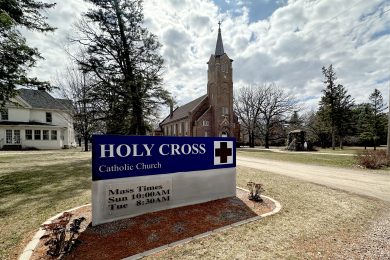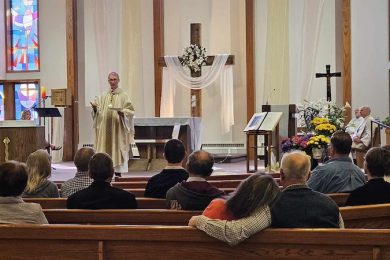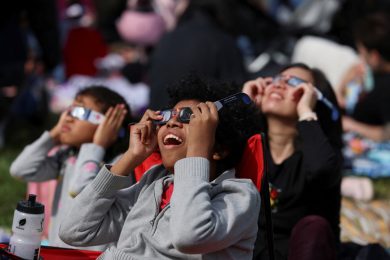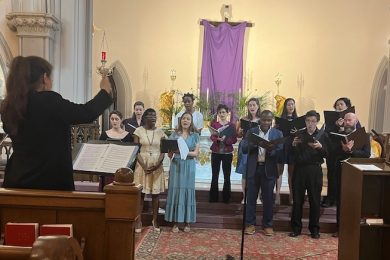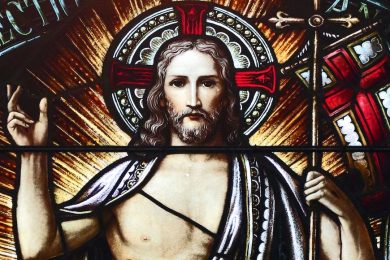By Simon Caldwell | Catholic News Service
A parishioner of a church in Western Australia captured the moment when police interrupted Mass to demand that five people who were not wearing face masks comply with the law.
The woman who photographed the raid at St. Bernadette’s Church in suburban Perth put the picture on Facebook. It was featured in a Feb. 4 report by 7News.com, an Australian broadcaster, and it has been viewed all over the world.
The scene resembled the moment when police in London halted a Good Friday service in 2021 after a complaint that COVID-19 regulations were not being met, telling more than 130 worshippers that the gathering was “unlawful” and threatening them with fines and arrest if they did not go home.
Since then, the situation has radically changed in England with the last remaining pandemic restrictions — including social distancing and compulsory wearing of masks in indoor public settings — were to be removed by the end of February. There will be a full return to work, free mixing of children in schools without face masks, freedom of travel, no vaccine passports, no vaccine mandates and no requirement to self-isolate after a positive test for COVID-19.

The English bishops, in their latest guidance, have suggested that face masks “may continue” to be worn by people in churches, if they wish, but the practice must continue in Wales and Scotland because of different government restrictions there.
Such progress has been possible partly because of the of the wave of the comparatively mild but more infectious omicron variant of COVID-19 supplanting earlier and more deadly variants, and also because of the success of a mass vaccination program.
The idea that vaccination is the way out of the pandemic is opening up new fault lines everywhere and particularly over the question of vaccine mandates, the obligation to have a vaccination in order to continue in employment or have access to other freedoms.
It is the issue of coercion, rather than the morality of the vaccines, that tends to be the preeminent source of tension between those who seek greater restrictions and those who seek greater freedom, and Catholics appear to be divided as societies in general.
The extent of Catholic support for mandates has been demonstrated not least by the Vatican, which on Dec. 23 declared that all employees must be vaccinated against the coronavirus or show proof of having recovered from it. It was a policy already in force in some U.S. dioceses, such as Chicago, where in August Cardinal Blase J. Cupich introduced vaccine mandates for all archdiocesan employees and clergy, though not for the laity.
As the omicron variant arrived in Europe, the bishops of Austria agreed to the imposition of a vaccine mandate if it was used “as a last resort,” and beginning Feb. 1 the government made vaccination compulsory for every citizen over the age of 18.
In neighboring Germany, Cardinal Reinhard Marx of Munich in neighboring Germany also said he was not opposed to the idea of mandatory vaccination, claiming it “can be an important step” in the fight against the coronavirus.
In Australia, agencies such as Catholic Health Australia went further, leading calls for compulsory vaccination of health and residential care workers, while in New Zealand the bishops said they “believe that, on balance, the introduction of vaccine mandates for certain sectors, as well as the use of vaccine certificates, are warranted for now.”
Churches in Australia are not listed among the public places in which a vaccine passport — proof of vaccination — is needed before a person may attend, and New Zealand operates a complex “traffic light” system, withdrawing liberties of vaccinated and unvaccinated people in different measures depending upon the severity and prevalence of an outbreak of COVID-19.
But in Canada, the government of Quebec in February imposed a requirement for vaccine passports in churches, prompting the bishops to say they are “deeply indisposed” by the measure and “deeply upset” by it, but would consent to it.
While agreeing with “the many believers” who think the vaccine passport is “an intolerable discrimination that deprives unvaccinated people of their right to religious freedom,” the bishops reminded that “Catholics have a duty to join with all members of society to ensure the safety and health of all.”
Catholic pastors in Singapore also were aggrieved by a government mandate demanding that all people without medical exemptions over the age of 12 have a vaccination before they are able to attend church. Some have appealed to the authorities to make concessions to allow parishioners to participate worship in public irrespective of their vaccination status.
In the U.S., the Becket Fund for Religious Liberty and the Thomas More Society in mid-February petitioned the Supreme Court to block New York’s coronavirus vaccine mandate for health care employees and allow religious exemptions to the vaccine mandate.
Some Catholics object to the use of COVID-19 vaccines because the animal-phase testing for some vaccines used stem cells from fetuses aborted 50 years ago. The Congregation for the Doctrine of Faith declared all of the vaccines to be morally licit in December 2020, and the Vatican recently updated its rules to require all of its employees to be vaccinated against the virus or prove they have recently recovered from the disease.
Both Pope Francis and retired Pope Benedict XVI have each received vaccines, with Pope Francis urging Catholics to accept a jab as an “act of love.”
Church teaching does not, however, authorize coercive medication. In its 2020 document, the doctrinal congregation noted a vaccine “is not, as a rule, a moral obligation … and must be voluntary.”
David Jones, director of The Anscombe Bioethics Centre, an institute serving the Catholic Church in the U.K. and Ireland, told Catholic News Service Feb. 15 it was unethical to attempt to impose a vaccination on someone who does not wish to have it.
“The need for informed consent is a fundamental principle of medical ethics,” he said. “There are Catholics in good conscience who argue that, in the extreme circumstances of a pandemic, it is legitimate to mandate people to take a vaccine. However, the view of The Anscombe Bioethics Centre is that vaccine mandates are coercive and unjust.
“Mandates are also divisive,” he said. “Mandates undermine the sense of shared solidarity and can be counterproductive. They lead to resentment and can lead to other harms such as staff shortages.”
Divisions within the Catholic Church are now beginning to express themselves in actions, for instance in the protests in Italy led by Father Emanuele Personeni, who began an anti-mandate pilgrimage across the country Feb. 11.
Bishop Francesco Beschi of Bergamo, his bishop, has disagreed with his stance and suspended him, citing vaccination as a “moral obligation” and a “legal obligation” and forbidding parishes from hosting any of his talks.
The mayor of Bergamo, a city ravaged by the pandemic, has also urged Bishop Beschi to suspend Fathers Alessandro Nava and Andrea Testa, who joined Father Personeni in authoring a pamphlet against forced vaccination last year.

